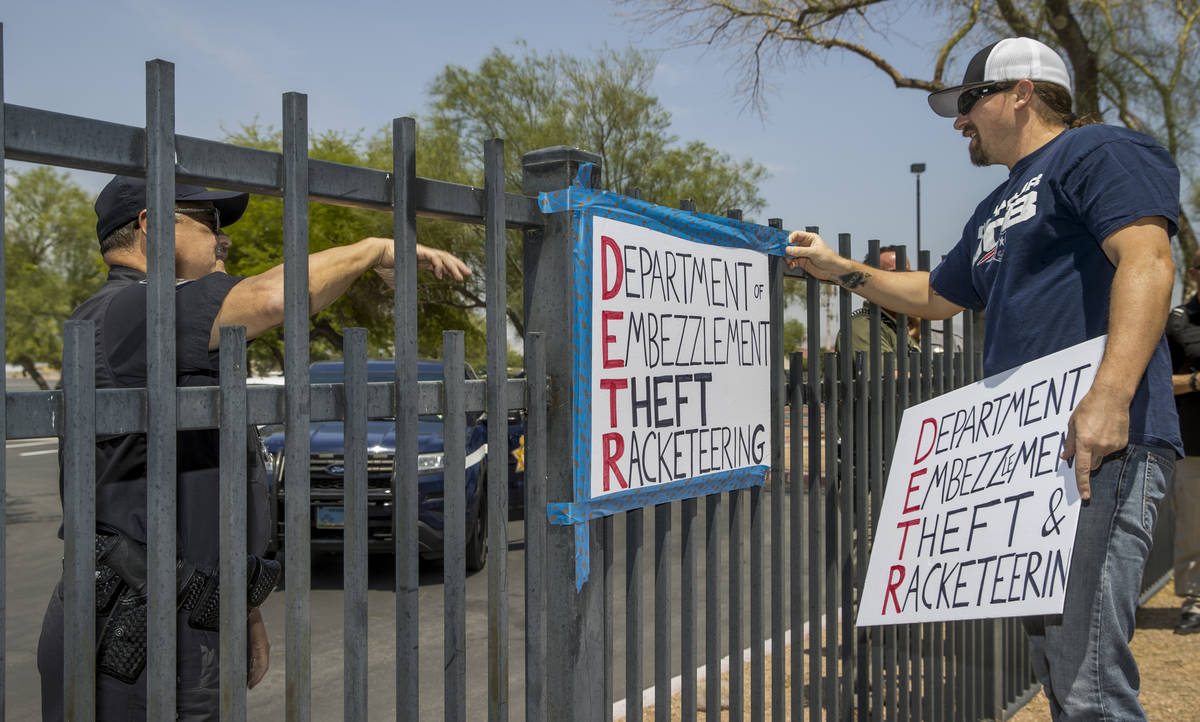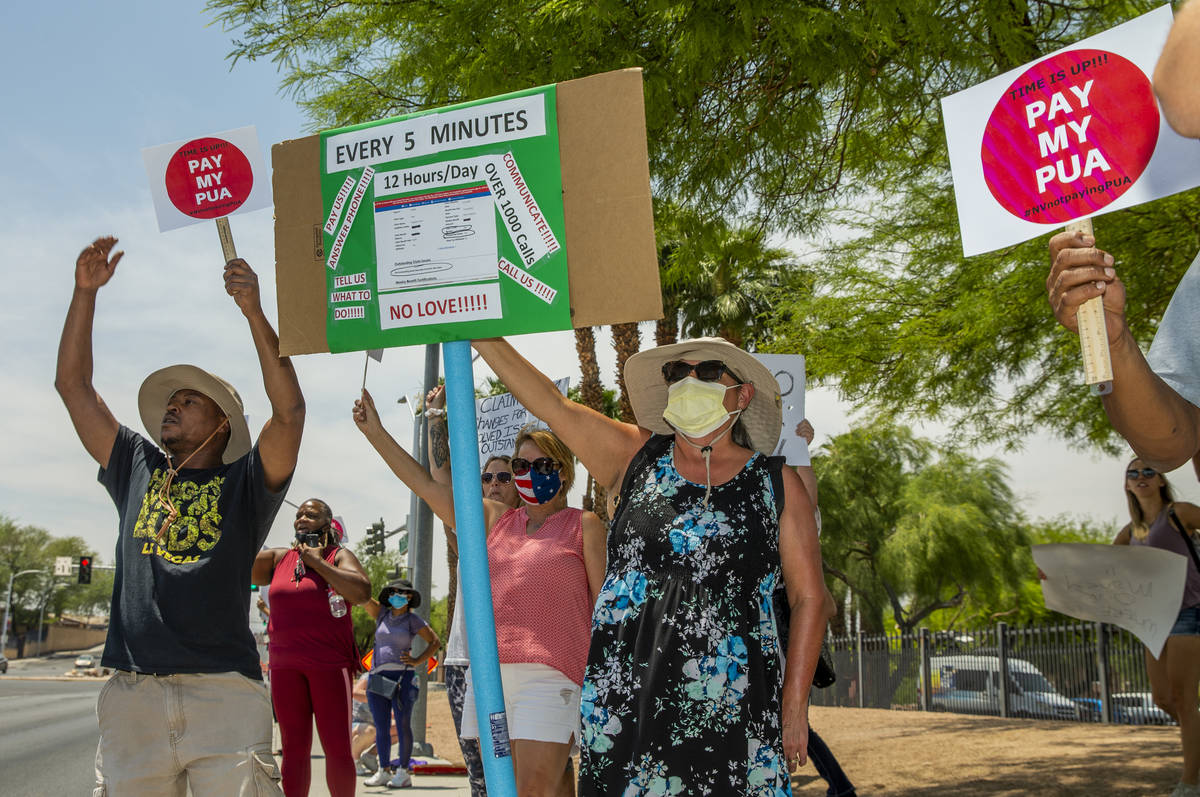Fund for jobless Nevadans expected to run dry in 7 weeks
Nevada’s pot of money for paying jobless benefits runs out in less than seven weeks.
The unemployment trust fund has already plummeted by about 86 percent since March, when Gov. Steve Sisolak mandated the closure of casinos, restaurants, bars and other nonessential businesses.
It took the state nearly seven years to rebuild its trust fund after the last recession, and, at this rate, it will take only around six months to empty it.
“There has been historic levels of claims, so what you’re finding is, even faster than any normal recession, states are burning through their state trust funds,” said Matt Weidinger of think tank American Enterprise Institute.
Filers will still be able to receive their benefits when the trust fund runs dry, but experts say the long-term impact will be felt by employers, who will likely face higher payroll taxes, and even new filers, who may see stricter eligibility requirements in coming years.
When depleted, Nevada can borrow as much as it needs from the federal government to continue paying benefits like it did during the Great Recession.
Rising rates
During 2010, Nevada’s unemployment rate hovered around a high of 13.5 percent.
This year, Nevada’s unemployment rate ballooned to the highest in the country at 25.3 percent in May, according to the most recent data from the U.S. Department of Labor. Hawaii follows at 22.6 percent, while Michigan comes in third at 21.2 percent.
A significant spike can also be seen when comparing the number of new claims during the Great Recession to the current pandemic- fueled economic downturn.

The Department of Employment, Training and Rehabilitation reported that 562,486 initial claims have been filed this year through the week ending July 4 — 96 percent of those new claims were filed since the week ending March 14.
During the Great Recession, the state saw a high of 36,414 new claims in December 2008 accounting for roughly a sixth of the claims Nevada Department of Employment, Training and Rehabilitation saw this March.
Weidinger said the high number of unemployment claims across the country means many states will exhaust their trust funds and look to borrow from the federal government.
But, he cautioned, the extra money is a loan, not a grant.
Nevada will likely have to raise payroll taxes to pay the loan back and help rebuild its trust fund, which is fully supported by employer payroll taxes.
“States having to resort to loans because their trusts are exhausted is going to even more immediately result in state’s having to automatically raise state payroll tax levels,” Weidinger said. “You can either raise the taxes to support the level of benefits you want to provide or you can cut (a filer’s) benefits somehow—you can cut the number of weeks, you can cut the dollar amount—there’s all sorts of ways on the benefits side you can adjust but there’s a balance.”
Seeing red
Nevada’s trust fund was $1.93 billion in January, the balance fell to $873.14 million at the end of June, according to data from the U.S. Department of the Treasury.
As of Wednesday, the fund’s balance was about $768.97 million.
DETR said at the beginning of this month it could pay 7.5 weeks of benefits at the current benefit payment rate.
“Should benefit payments remain high and the trust fund be exhausted, Nevada would likely first turn to federal borrowing,” DETR said.
The interest rate states will incur is about 2.4 percent as of July 9, but thanks to the passage of the Families First Coronavirus Response Act in March, states will be able to borrow interest-free through the end of this year.
DETR said it also expects the trust to see a boost next month.
“In August, employer contributions for wages from April (to) June will be due, and DETR is working with the U.S. Department of Labor to get federal reimbursement for the first week of benefits in each claim, under a provision from the CARES Act,” according to DETR.
Money for the three unemployment provisions under the CARES Act, such as paying an additional $600 to filers each week, is federally funded and not drawn from the state trust fund.
‘Nevada resisted…’
National Employment Law Project Senior Researcher and Policy Analyst Michele Evermore said she’s “not at all surprised” Nevada is looking to the federal government for help, noting at least eight other states have taken out a federal loan such as California, New York and Texas.
“Nevada did not enter this recession in a bad position and it running out of money is more a factor of the high, high, high unemployment rate than it is not being good stewards of their trust fund,” she said.
Evermore said before the economic impact of the coronavirus, Nevada’s trust was funded enough to manage benefits for a year and a half during a normal recession.
During the Great Recession, the state’s trust fund was emptied out and it reached out to the feds for additional funds.
At the time, the state’s unemployment rate was nearly 14 percent and it borrowed an estimated $773 million to cover unemployment benefits. Nevada paid back the loan in 2017, nearly seven years after taking it out.
Evermore said Nevada, unlike other states, refrained from trimming unemployment benefits as a way to rebuild its trust fund coming out of the economic slump.
“Nevada resisted the urge to do that after the last recession, admirably,” she said. “I don’t anticipate that would be the case after this recession, but you never know.”
Nevada and other states are facing an unprecedented economic situation and steps taken to rebuild the trust this time around will likely be different, according to the Century Foundation Senior Fellow Andrew Stettner.
“Unemployment taxes are going to go up probably significantly (for employers) back to the levels they were at in 2011 (and) 2012,” he said. “There is a risk (states will) cut benefits to pay back the trust fund loan. In the short term, it’s not a huge deal but in the long term, it’s a big deal.”
Contact Subrina Hudson at shudson@reviewjournal.com or 702-383-0340. Follow @SubrinaH on Twitter.












































